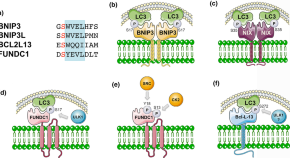
Collection
Mitochondrial Damage Control
- Submission status
- Closed
Mitochondria supply cellular energy through oxidative phosphorylation and fulfill numerous additional functions that are fundamental to cellular homeostasis and stress responses. Mitochondrial malfunction, arising from inherent defects of the organelle itself, aging, or acute or chronic stress, can cause substantial damage to organismal health. For instance, mitochondrial malfunction contributes to inflammation, neurodegeneration, tumorigenesis and cardiovascular diseases. Therefore, various quality control mechanisms exist that support a functional mitochondrial organelle compartment. The CMLS Forum Reviews introduced here present a collection of articles covering select topics on basic mechanisms and pathophysiological contexts of mitochondrial damage control.
Read the full Introduction article written by Guest Editor Anne Hamacher-Brady
Editors
-
Anne Hamacher-Brady
Anne Hamacher-Brady is an Assistant Professor at the Johns Hopkins Bloomberg School of Public Health in Baltimore (USA) in the Department of Molecular Microbiology and Immunology. She is primarily interested in the investigation of the mitochondrial contribution to regulated cell death and inflammation and how the endolysosomal system impacts function and dysfunction of the mitochondrial organelle compartment. Her work utilizes classical molecular and cell biological approaches in combination with advanced microscopy techniques.
Articles (7 in this collection)
-

-
CMLS forum reviews: mitochondrial damage control
Authors
- Anne Hamacher-Brady
- Content type: Editorial
- Published: 12 March 2021
- Pages: 3763 - 3765
-
Links between mitochondrial retrograde response and mitophagy in pathogenic cell signalling
Authors
- Daniela Strobbe
- Soumya Sharma
- Michelangelo Campanella
- Content type: Review
- Published: 23 February 2021
- Pages: 3767 - 3775

-
Mitochondrial dynamics in cancer stem cells
Authors
- Dane T. Sessions
- David F. Kashatus
- Content type: Review
- Published: 13 February 2021
- Pages: 3803 - 3816

-
Mitophagy in tumorigenesis and metastasis
Authors
- Logan P. Poole
- Kay F. Macleod
- Content type: Review
- Published: 13 February 2021
- Pages: 3817 - 3851

-
Mitochondrial outer membrane permeabilization at the single molecule level
Authors
- Shashank Dadsena
- Andreas Jenner
- Ana J. García-Sáez
- Content type: Review
- Open Access
- Published: 12 February 2021
- Pages: 3777 - 3790

-
At the heart of mitochondrial quality control: many roads to the top
Authors (first, second and last of 7)
- Roberta A. Gottlieb
- Honit Piplani
- Juliana de Freitas Germano
- Content type: Review
- Open Access
- Published: 05 February 2021
- Pages: 3791 - 3801



